By Melissa Boufounos, CHN
Hydration is key to staying healthy and feeling good on and off the ice. Whether you’re playing hockey for fun or competing at a higher level, staying properly hydrated helps keep your energy up, your muscles working efficiently, and your body safe from injury. But hydration isn’t just about chugging water right before a game—it’s something you need to stay on top of throughout the day.
How Much Water Should You Drink?
A good rule of thumb for daily hydration is to drink half your body weight in ounces of water. For example, if you weigh 160 pounds, divide that by two, and you should aim for 80 ounces of water per day. That’s about 10 cups of water. This is your base hydration level, and you’ll need to drink more to replace fluids lost during games, especially if you’re sweating a lot.
Check Your Hydration with a Simple Urine Test
Wondering how to tell if you’re hydrated? A quick and easy way to check is by looking at the color of your urine. If it’s pale yellow, like lemonade, you’re in a good spot. But if it’s dark, like beer or apple juice, you’re dehydrated and should drink more water.
A common misconception is that your urine should be clear. However, clear urine might be a sign that you’re overhydrating and could benefit from more electrolytes. Adding a pinch of salt to your meals is an easy way to boost your electrolyte intake, which helps your body balance fluids more effectively.
Electrolytes: Do You Need Them?
For most people, regular water intake throughout the day is enough to stay hydrated. But if you work a physically demanding job or sweat heavily during your hockey games, you may need more than water. Electrolyte supplements can help replenish minerals like sodium, potassium, and magnesium that are lost through sweat. These can come in the form of electrolyte tablets, powders, or drinks and can be a helpful addition if you’re sweating a lot.
Tips to Stay Hydrated
Staying hydrated is easier when it becomes a habit. Here are a few tips to make sure you’re drinking enough water each day:
- Start early: Drink a glass of water first thing in the morning to kickstart your hydration.
- Carry a water bottle: Keep a reusable water bottle with you throughout the day so you can sip regularly.
- Set reminders: Use your phone to set hydration reminders if you tend to forget to drink water.
- Drink with meals: Pair your meals with a glass of water to easily add more to your daily intake.
- Hydrate before and after games: Aim to drink water before hitting the ice and continue to rehydrate afterward to replace any fluids lost during the game.
Enhancing Your Water
If you’re not a fan of plain water, you can enhance it with a few simple tricks:
- Add fruit: Toss in slices of lemon, lime, cucumber, or berries for a refreshing flavor boost.
- Infuse herbs: Fresh herbs like mint or basil can add a fresh taste to your water.
- Try electrolyte tablets: These can give your water a light flavor while also adding essential minerals.
- Chill it: Cold water can be more appealing and refreshing, especially after a game.
Other Ways to Stay Hydrated
Water isn’t the only way to stay hydrated. You can get fluids from a variety of other sources, including:
- Fruits and veggies: Foods like watermelon, cucumbers, and oranges are packed with water and can help with hydration.
- Herbal teas: Teas like chamomile or peppermint are great for staying hydrated and can offer a caffeine-free alternative later in the day.
- Broths and soups: These are excellent hydration options, especially during colder months when water may not seem as appealing.
- Coffee: Contrary to popular belief, a few cups of coffee per day can contribute to your hydration intake and does not lead to dehydration.
- Hydrating beverages: Smoothies, coconut water, fruit juice, and milk all count towards your fluid intake.
Takeaway
By making hydration a priority throughout the day, not just before or during a game, you’ll feel better on the ice and help protect your body from injury and fatigue. Remember to listen to your body, check your hydration levels with the urine color chart, and add electrolytes if needed, especially if you’re sweating a lot. Hydration is simple but essential—stay on top of it, and your body will thank you!
